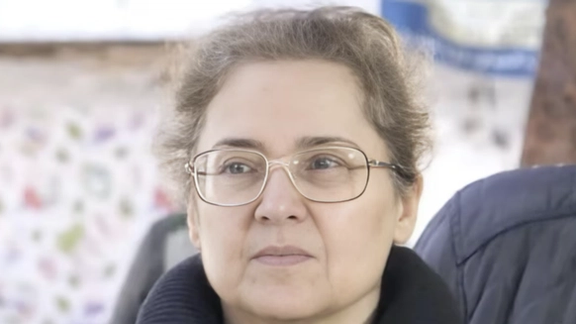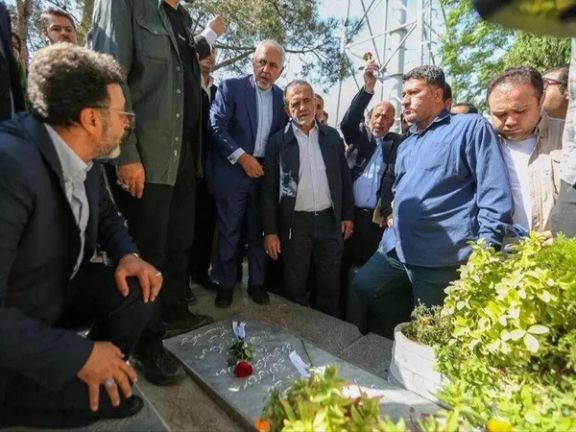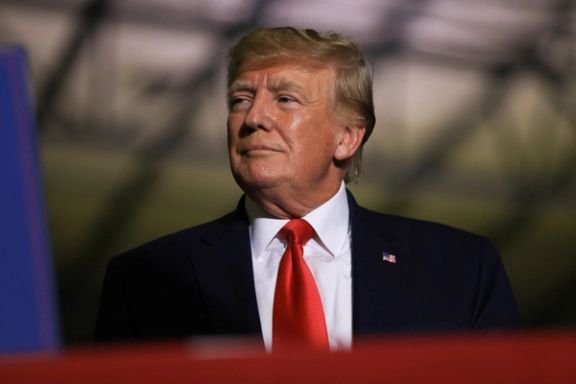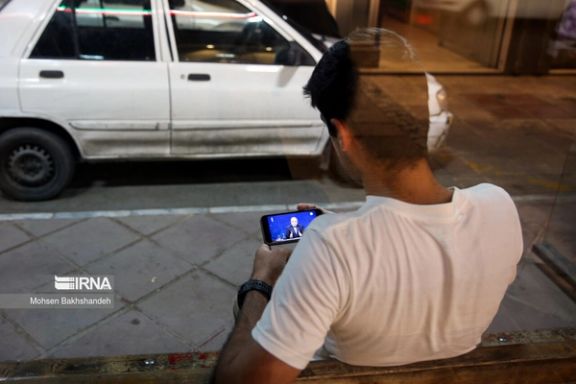Voting Legitimizes the Islamic Republic, Prominent Scholar Warns

Iranian female Islamic scholar Sedigheh Vasmaghi has contended that participating in the upcoming snap presidential elections will bolster the Islamic Republic's authority.

Iranian female Islamic scholar Sedigheh Vasmaghi has contended that participating in the upcoming snap presidential elections will bolster the Islamic Republic's authority.
“When voter turnout is low, the ruling factions lose confidence, but high turnout empowers and validates them,” the academic wrote on her Instagram account on Friday.
“I view the people's vote as a valuable social and national asset that should not be squandered or benefit those responsible for current issues,” she added.
Previously, she cautioned "reformist" politicians against becoming ensnared in an unchangeable political system and "falling into the trap of tyranny."
Vasmaghi argued that currently, the Islamic Republic "is unable to confront the powerful and pervasive wave of change that has infiltrated its own ranks."
"In this context, to resist this tide, the ruling establishment has no alternative but to collaborate with a spectrum of reformists—a spectrum that is not threatening but rather enhances its authority."
Vasmaghi was detained in March for denouncing Supreme Leader Ali Khamenei as a dictator and criticizing compulsory hijab laws. Her health deteriorated during imprisonment, leading to her eventual release.
During her incarceration, Vasmaghi wrote to the United Nations Fact-Finding Mission and international human rights organizations, detailing the mistreatment she had to face and highlighting Iran's systemic oppression, especially towards women.

'Reformist' presidential candidate Masoud Pezeshkian's use of an iconic song from Iran's nationwide protests in his presidential campaign has sparked backlash on social media.
Critics assert that while Pezeshkian slammed the protests, dubbed Woman, Life, Freedom, he has appropriated the movement's song, “Baraye,” for his own political gain.
The demonstrations, lasting for months, began in the wake of the death of 22-year-old Mahsa Amini while in police custody, resulting in over 550 deaths.
In 2022, Pezeshkian condemned the demonstrations as orchestrated acts of hostility, blaming America and Europe for igniting Iran's worst uprising since the founding of the Islamic Republic.
Singer-songwriter Shervin Hajipour, honored with the Grammy's Best Song for Social Change in 2023 for "Baraye," was sentenced to more than three years in prison for incitement and provocation to disturb national security through his music.
He is one of dozens of artists imprisoned or levied with the likes of work bans, bank account freezes and travel bans for supporting the protests.
“Dear Mr. Pezeshkian, using Shervin's song this way may cost you votes because you were indifferent to the Woman Life Freedom movement,” a user wrote on X.
“Mr. Pezeshkian, please don’t use “Baraye” for the clerical establishment. It belongs to the people, not them,” another user wrote on X.
Critics on social media also highlighted Pezeshkian's silence on Hajipour's sentence.
US officials, including First Lady Jill Biden, praised the song as a powerful advocate for freedom and women's rights, underscoring its potential to inspire societal change.
State Department spokesman Matthew Miller condemned Hajipour's sentence as indicative of Iran's broader crackdown on dissenting voices.
When released, the song "Baraye" gained immense popularity. Within two days, it swiftly amassed over 40 million views on Shervin’s Instagram.
The Persian word “Baraye”٬ meaning “for …” or “for the sake of” punctuates each line of the song, crafted from a mosaic of Iranian tweets lamenting societal challenges: "For dancing in the streets; for fear of kissing; for the students and their future," and "for women, life, freedom."
While Pezeshkian is the only reform candidate among the six final candidates in the upcoming snap elections on June 28, he has grown increasingly more conservative in a bid to win the coveted presidential seat.

Iranian Nobel Peace Prize laureate Narges Mohammadi denounced the upcoming June 28 snap presidential election in Iran, calling it a facade orchestrated by an oppressive regime.
In a message from Evin Prison in Tehran on Saturday, Mohammadi said:
“I will not participate in the illegal elections of the oppressive and illegitimate government.”
Mohammadi questioned the integrity of the elections, highlighting the contradiction in the government's actions.
“How can you, while holding a sword, gallows, weapons, and prisons against the people with one hand, place a ballot box in front of the same people with the other hand, and deceitfully and falsely call them to the polls?”
Mohammadi further criticized the true intent behind the elections:
“The only purpose of holding elections for a regime that believes in repression, terror, and violence as the sole means to maintain power is not to uphold democracy and the rights of the people but to consolidate power and tyranny. Such elections will not bring legitimacy to the Islamic Republic.”
Six hand-picked candidates approved by Iran’s Guardian Council have been allowed to run in the presidential elections amid strict media control, while Iranian media and government officials admit a low level of voter interest.

The families of Flight PS752 victims, downed by IRGC missiles in 2020, say they are outraged by the recent visit of Iran's former Foreign Minister Javad Zarif to the graves of victims in Esfahan.
“The presence of Javad Zarif at the graves of our loved ones is outrageous,” the families’ association said in a statement.
“Javad Zarif is one of the individuals involved in covering up the crime of January 8, 2020, and the visits of any of the perpetrators and instigators of the crime to the graves of our loved ones once again demonstrate that the impudence of the officials of the Islamic Republic knows no bounds,” the statement added.
The Ukrainian Airline flight took off from Tehran in the early hours of that faithful day and minutes later two anti-air missiles fired by the IRGC downed the plane. For three days the authorities tried to cover up the incident, claiming a mechanical problem with the aircraft, until videos emerged showing the moment of impact. Zarif was foreign minister, and was heard saying that if the military had told him the truth earlier, he could have helped explain away the the incident.
It also said that Zarif and other authorities responsible for the downing of flight PS752, from IRGC Aerospace Chief Amir-Ali Hajizadeh to IRGC Chief Hossein Salami, and from the operator to Ali Khamenei, must be tried in a fair court.
”That day will come,” the statement said. “We neither forget nor forgive the perpetrators and instigators of this crime.”
Javad Soleimani, a member of PS752 Association’s board, earlier referred to Zarif and presidential candidate Masoud Pezeshkian who visited the graves together as "puppets" participating in Iran's "election circus."
Pezeshkian is backed by groups within regime politicians who are known as 'reformists' and he is running as a 'moderate.' Zarif, coming out of political retirement after three years, has joined the candidate, urging a reluctant electorate to vote for him. The visit to the resting place of the crash victims is seen as a campaign stunt by Pezeshkian, but Zarif's presence has angered many.
The Association’s statement drew attention to a controversial audio file leaked in 2021 in which Zarif was heard suggesting that the PS752 downing was likely unintentional.
"We will not forget the audio file of Zarif saying it was unlikely that the downing of the Ukrainian plane was intentional but if it was, they could tell us so we can ‘remedy’ it," Soleimani stated on X on Friday.
In the leaked audio file, Zarif was also captured stating that the truth surrounding the downing of PS752 would never come to light. Iranian officials attributed the downing of PS752 to "human error".
The flight PS752, which was shot down by the Islamic Revolutionary Guard Corps (IRGC) in January 2020, claimed the lives of 176 passengers and crew, including Soleimani's wife, Elnaz Nabiyi.

Former US President Donald Trump says he was ready to “make a deal” with Iran on “everything” toward the end of his term, claiming that Tehran also “wanted” a deal because the country was in dire straits as a result of his tough sanctions.
“Iran was broke. They had no money. I sanctioned the countries that wanted to buy oil from Iran. And I would’ve made a fair deal with Iran. I was gonna get along with Iran,” Trump said on the All In podcast Thursday.
“The deal was simple: Iran can’t have a nuclear missile. It cannot have that nuclear capability. Other than that we talk about everything. They would’ve been very happy,” he added.
These remarks might surprise or alarm many Iranians who have been following the US presidential campaign, assuming that a Trump win over Biden could mean a dramatic shift in policy towards Iran and exerting more pressure on the Islamic Republic.
Joe Biden and Donald Trump will go head to head next week in their first presidential debate in the run up to the election in November. Trump’s words Thursday was a glimpse into what may be coming in that debate, as far as foreign policy and relations with Iran are concerned.
“I had them at a point where you could’ve negotiated,” Trump said about Iran. “A child could have made a deal with them. And Biden did nothing.”
Biden won the 2020 election with an explicit promise to revive the 2015 nuclear deal that president Trump abandoned in 2018. In pursuit of the ‘revival’, the Biden administration reversed Trump’s 'maximum pressure' sanctions campaign and, in effect, allowed Iran to sell its oil, mainly to China utilizing its ‘shadow’ fleet.
“A young man that does nothing, or a young woman that does nothing in kindergarten could’ve made a deal with Iran at that time. Because they wanted to make a deal. And Biden never took advantage of it,” Trump said in the podcast lambasting Biden.
“Now… China buys billions and billions of dollars of oil every month… And now they’re much tougher to deal with.”
Critics of president Biden's Iran policy also make the point that by being "soft" on the Islamic Republic he allowed Tehran to recover from Trump's pressure and have resources not only to expand its nuclear program to a dangerous level but also strengthen its proxy forces in the region. Some argue that if Iran had remained under severe financial strain Hamas would not have been able to attack Israel on October 7.
This is a line that many expect Donald Trump to use more often towards the November election, especially as US policy on Iran is inextricably linked to Israel and the ongoing war in Gaza and the wider crises in the Middle East.
“Towards the end of my term… there was no terror going on,” Trump said when asked about October 7th and the attack on Israel. “That attack would’ve never happened in a million years. Iran didn’t have the money for Hamas. They didn’t have the money for Hezbollah… Iran was broke, I say respectfully.”
Donald Trump also said he thought Iran would have "eventually" joined the Abraham accords, which saw the UAE and Bahrain sign 'normalization' agreements with Israel. It was the first such agreement since Israel's peace treaty with Jordan in 1994.

The third round of Iran's presidential debates focused on cultural issues, with the government's treatment of women and internet restrictions being the main points of contention.
Candidates took turns discussing the brutal crackdown on women defying the mandatory hijab, despite their own roles in intensifying the enforcement.
Mohammad-Bagher Ghalibaf, the current parliament speaker, Masoud Pezeshkian, a member of parliament, and Tehran mayor Alireza Zakani are all directly involved in the new regulations the Islamic Republic is crafting to maintain control over Iranian women's public appearance.
For the past 45 years, Iran's clerical rulers have imposed stringent Islamic laws, regulations, and punishments to control citizens' private lives.
A dress code, including mandatory hijab and unequal rights for women, religious indoctrination in schools, a ban on alcoholic beverages, and medieval punishments like flogging for minor offenses – all were imposed on a society rapidly modernizing before the 1979 revolution.
Many Iranians, particularly Generation Z, reject some or all of these religious rules defined by Iran's Shia clerics. This rejection fueled the nationwide anti-regime protests in September 2022, sparked by the death of a 22-year-old woman in police custody for "improper" hijab.
Iran’s Generation Z in particular mostly reject a religious state and seek a secular government that would allow them social freedoms, such as enjoying music and dancing.
The candidates' statements displayed an ambivalence. On the one hand, they defended women's autonomy in choosing their public attire. On the other hand, they defended the government's crackdown on those who defy the mandatory dress code.
Since the 2022 nationwide protests, harshly suppressed by security forces, enforcing the hijab has become a significant challenge. Women increasingly appear in public without it. The government has implemented various measures to enforce hijab, and the parliament and the Guardian Council are wrangling over a new law to penalize women who defy it. Punishments include using surveillance cameras to identify these women, blocking their bank accounts, and withholding services – tactics used for humiliation.
No candidate offered a clear solution for Iranian women who oppose the government's dress code. Founded in 1979, the Islamic Republic is the only Muslim-majority country besides Taliban-ruled Afghanistan with such a strict interpretation of hijab and nationwide coercive measures for its observance. This occurs despite Islam being the official religion in 26 countries across Asia, sub-Saharan Africa, North Africa, and the Middle East.
Internet restrictions were also a topic of debate. Some candidates criticized the blocking of hundreds of websites and popular social media platforms. However, most proposed developing a national intranet under state control.
Even Masoud Pezeshkian, the reformist-backed candidate, defended the government's "intervention" in internet access, justifying shutdowns during national crises. "When intervention is necessary in a specific crisis, I will intervene," he stated. The Islamic Republic has a history of cutting off the internet during nationwide protests.
Pezeshkian claimed that all countries intervene in internet access, a frequently repeated but inaccurate defense by Iranian officials. He further argued that use of VPNs by citizens facilitates access to "obscene" content.
The candidates also threw their weight behind the expansion of Iranian alternatives to international social media platforms and websites, with some of them mentioning specific brands that have been created in Iran as the country has blocked the access of people to the free internet.
In the face of such restrictions, most Iranians have started using VPNs (filter breakers) to access the global internet, leading to the creating of a huge market for such services.
Mustafa Pourmohammadi said during the debate that the financial turnover of VPNs is 50% of the financial turnover of cyberspace in Iran.
There are no precise statistics on the financial turnover of VPNs in Iran. The latest estimates are between 200 and 300 trillion rials per year (about $500 million).
Pourmohammadi, like several other candidates, has been pledging to remove the country’s restrictions on the internet but such restrictions are not under the control of the president. Earlier in the day, Iran's Minister of Information and Communications Technology refuted presidential candidates' promises to lift internet censorship, stating that the president does not have the authority to make that decision.